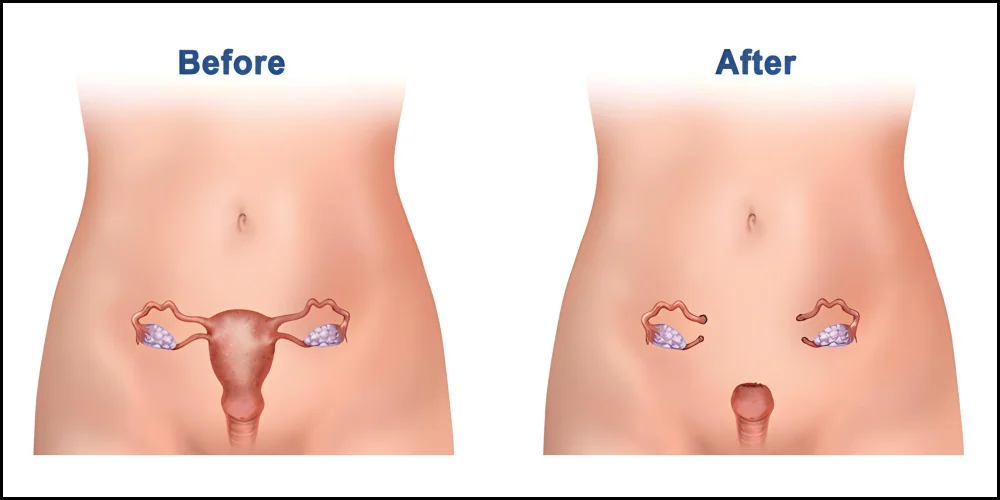Hysterectomy Surgery
Advanced, Safe, and Compassionate Care for Women’s Health Needs
A Hysterectomy is a surgical procedure to remove the uterus of a woman which is often suggested for the treatment of various gynecological disorders. It is a procedure that can be used to treat fibroids or endometriosis, cancer of the uterus or chronic pain, an hysterectomy may provide relief of symptoms and increase your quality of life. Here at Chirayu Super Speciality Hospital, we are aware of the emotional and physical aspects of the procedure. Our highly skilled team of surgeons and gynecologists provides individualized care to ensure that the procedure is as secure as efficient, comfortable, and effective as is possible. By using the most advanced minimally-invasive techniques, we work to ensure the best results with quicker healing times.

What is a Hysterectomy?
A Hysterectomy is a surgical procedure to remove the uterus of a woman and, in certain instances other reproductive organs, such as the fallopian tube, ovaries and cervix could be removed as well. The procedure can be carried out using a variety of methods such as vaginal, abdominal laparoscopic, robotic-assisted methods, based on the condition of the patient and the advice of the surgeon. After a hysterectomy menstrual periods cease and it’s no longer feasible to become pregnant, which is an important choice for many women.
Who Performs Your Surgery?
Chirayu Super Speciality Hospital, the hysterectomy procedure is performed by the highly trained and experienced gynecologists as well as surgeons. Our surgeons are proficient in both conventional and minimally-invasive surgical techniques that ensure the highest standard of treatment. The surgical team works in close collaboration with nurses, anesthesiologists as well as other healthcare professionals, to provide complete support prior to and during the procedure. Our primary focus is on the patient’s security, comfort, and getting the best results possible.
Types of Hysterectomy Surgery
- Total Hysterectomy : This involves elimination of whole part of the uterus, including the cervix. It is by far the most popular kind of hysterectomy.
- Subtotal (Partial) Hysterectomy : Only the upper part of the pelvis but leaves the cervix unaffected. Sometimes, this procedure is performed to preserve pelvic organs.
- Radical Hysterectomy : The procedure involves removing the cervical cervix, the uterus, the part of the vagina, as well as the surrounding tissues. The procedure is typically used in cases of cancer.
- Hysterectomy with Salpingo-Oophorectomy : This involves elimination of the uterus with both or one of the fallopian tubes as well as the ovaries. usually recommended if endometriosis that is severe or cancerous is found.
- Laparoscopic and Robotic Hysterectomy : Minimally-invasive procedures that require small incisions. This results in quicker recovery and less post-operative discomfort. Robotic surgery offers increased precision with robotic arms operated by the surgeon.
Symptoms Indicating the Need for Hysterectomy Surgery
- Urinary bleeding that is abnormal and severe which isn’t responding to other treatment options.
- The chronic pelvic pain is linked to conditions such as endometriosis, fibroids or the adenomyosis.
- Large fibroids that cause bleeding, pain, or other signs.
- Uterine prolapse is when the uterus slides in the canal of vaginal birth.
- Gynecological tumors, like ovarian, uterine, and cervical cancer.
- Endometriosis, adenomyosis, or other a doesn’t respond to other treatment options.
Diagnosis for Hysterectomy Surgery
The diagnostic process involves an exhaustive examination of the patients medical background, physical examination and diagnostic tests like abdominal ultrasounds, MRI, CT scan and biopsy. Tests for blood can also be performed to evaluate the overall health. Gynecologists can recommend further procedures such as hysteroscopy and laparoscopy in order to gain a greater understanding of the condition of the uterus. Based on these results an individual treatment plan which includes the type of hysterectomy required to be discussed.
Treatment Process
The procedure for treating the hysterectomy starts with pre-operative counseling. During this time, patients meet an expert surgeon who will discuss procedures, their advantages and risks, as well as the recovery. The type of hysterectomy chosen and the method of surgery chosen, the procedure may be performed in a period of one to several hours. Anesthesia is used to ensure comfort before the surgeon begins by removing the uterus, as well as other specified structures. Following the procedure the patient is monitored in the recovery room prior to being transferred into a hospital room, or discharged on the same day, based on the type of procedure that was performed.
Care and Recovery After Surgery
The post-operative care is essential for the successful recovery following a surgery called a hysterectomy. Patients might experience some discomfort and discomfort that is manageable by taking prescribed pain medication. It is important to stay away from extreme lifting, strenuous activities as well as sexual interactions for a few weeks following the procedure to allow for the proper healing process. Regular follow-up appointments are essential to track the progress of recovery and address any issues. The majority of patients resume normal activities within 4 to 6 months, and with the use of laparoscopic or robotic-assisted procedures allowing for even faster recovery times.
Advantages of Choosing Our Surgery Services
Minimally Invasive Techniques
Our hospital offers advanced laparoscopic and robotic-assisted hysterectomy options for reduced pain, minimal scarring, and faster recovery.
Expert Surgical Team
Our team of skilled gynecologists and surgeons ensures high-quality care, tailored treatment plans, and successful surgical outcomes.
Personalized Approach
Each patient's treatment plan is customized to their specific health needs, ensuring the best possible results.
What Our Patients Say
Read about our patients positive experiences and how Chirayu Super Speciality Hospital has positively impacted their health and well-being.


The surgery team at Chirayu was exceptional. I’m grateful for their care and expertise, which made my surgery a success.


The nurses and doctors at Chirayu provided amazing support and guidance, making my surgery and recovery stress-free.


The surgeons and staff made me feel comfortable and informed throughout my hysterectomy procedure. I couldn’t have asked for better care.


The hysterectomy relieved my chronic pain and improved my quality of life. The care at Chirayu was exceptional!
Meet Our Medical Specialists
Our skilled gynecologists specialize in safe, effective hysterectomy procedures, offering compassionate care to improve women’s health and well-being.
Frequently Asked Questions
Here, we provide answers to some of the most commonly asked questions to help you better understand about our surgery services. If you have any additional questions, please do not hesitate to contact us.
Common types include total, subtotal, radical hysterectomy, and hysterectomy with salpingo-oophorectomy, using approaches like abdominal, vaginal, laparoscopic, or robotic surgery.
Recovery time varies; minimally invasive hysterectomy may require 2-4 weeks, while abdominal hysterectomy may take 6-8 weeks for full recovery.
Hysterectomy is often recommended for treating uterine fibroids, chronic pelvic pain, abnormal bleeding, endometriosis, uterine prolapse, or certain cancers.
Some discomfort and pain are normal post-surgery, but these can be managed with medication and usually subside within a few weeks.
A hysterectomy is a surgical procedure to remove a woman’s uterus and, sometimes, other reproductive organs to treat certain health conditions.



